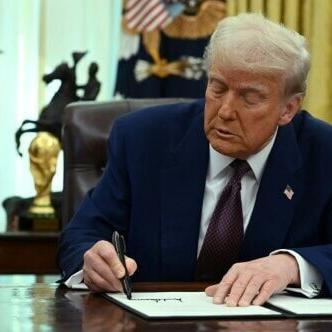Cloudy skies. High 34F. Winds SW at 5 to 10 mph..
Mainly clear skies. Low 19F. Winds SW at 5 to 10 mph.
Updated: February 14, 2025 @ 12:13 am
Donald Trump signed an Executive Order on reciprocal tariffs Thursday but his commerce secretary nominee said they might not be implemented until April, giving room for negotiations
Donald Trump signed an Executive Order on reciprocal tariffs Thursday but his commerce secretary nominee said they might not be implemented until April, giving room for negotiations
Asian markets mostly rose Friday in line with a rally on Wall Street as traders were buoyed by news that Donald Trump’s latest, sweeping reciprocal tariffs would not likely be implemented until April, giving time for negotiations.
The president has unveiled a range of hardball measures to bring an end to what he says is years of countries taking advantage of the United States, fuelling trade war fears and leading to warnings of another inflation spike.
However, investor sentiment has largely held up on hopes that many of the tariffs can be rowed back with negotiations, while Trump’s announcement of plans to hold Ukraine peace talks with Russian counterpart Vladimir Putin has added some optimism.
The Republican said Thursday he had decided to impose fresh reciprocal duties on trading partners, telling reporters that US allies were often “worse than our enemies” on trade, calling the European Union “absolutely brutal”.
“Whatever countries charge the United States of America, we will charge them,” he added.
However, commerce secretary nominee Howard Lutnick said studies on where and who to hit should be completed by April 1, and the tariffs could start the day after — providing some relief to investors.
“Tariff ambiguity still reigns, but markets are currently drawing some comfort from the news,” said National Australia Bank’s head of forex research and markets Ray Attrill.
The move came days after Trump signed executive orders imposing new 25 percent tariffs on steel and aluminum, due to come into effect on March 12.
Observers said there appeared to be a feeling on trading floors that the measures were being used as a negotiating tactic by the White House.
Asian markets enjoyed a broadly positive end to the week.
Hong Kong gained more than two percent, with Shanghai, Sydney, Seoul, Wellington and Jakarta following suit.
Tokyo dropped despite an 8.7 percent surge in Sony following a healthy earnings report as well as rallies in Nissan and Honda a day after they confirmed the scrapping of merger talks.
Singapore, Bangkok, Mumbai and Taipei also fell.
Wall Street provided a strong lead thanks to a rally in the tech sector. The S&P 500 ended just short of a record and the Nasdaq put on more than two percent.
New York traders were largely unmoved by a forecast-topping rise in US wholesale prices last month, which followed Wednesday’s report on the consumer price index that also came in above expectations and dented hopes for another interest rate cut.
Tokyo – Nikkei 225: DOWN 0.8 percent at 39,149.43 (close)
Hong Kong – Hang Seng Index: UP 2.6 percent at 22,375.90
Shanghai – Composite: UP 0.4 percent at 3,346.72 (close)
Euro/dollar: DOWN at $1.0459 from $1.0467 on Thursday
Pound/dollar: DOWN at $1.2561 from $1.2586
Dollar/yen: DOWN at 152.52 yen from 152.76 yen
Euro/pound: DOWN at 83.26 pence from 83.28 pence
West Texas Intermediate: UP 0.1 percent at $71.35 per barrel
Brent North Sea Crude: UP 0.2 percent at $75.16 per barrel
New York – Dow: UP 0.8 percent at 44,711.43 (close)
London – FTSE 100: DOWN 0.5 percent at 8,764.72 (close)
dan/fox
Originally published on doc.afp.com, part of the BLOX Digital Content Exchange.
Currently in Kennewick
Sorry, there are no recent results for popular commented articles.
Sign up to get breaking news, weather forecasts, and more in your email inbox.
Your browser is out of date and potentially vulnerable to security risks.
We recommend switching to one of the following browsers:
Get up-to-the-minute news sent straight to your device.




